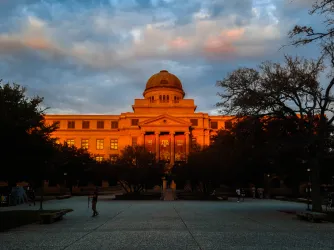Table of Contents
Perilous times: The plight of local papers — First Amendment News 401

First Amendment News is a weekly blog and newsletter about free expression issues by Ronald K. L. Collins. It is editorially independent from FIRE.
There is a lot of talk these days about originalism and the need to preserve the past bequeathed to us by the Founders. Central to that vision as it relates to the First Amendment was local journalism — the kind dished out by Benjamin Franklin Bache, grandson of Benjamin Franklin and publisher of the Philadelphia Aurora.
Romanticism aside, that portion of the Fourth Estate is being destroyed with ever-increasing rapidity. Fact: “Between the pre-pandemic months of late 2019 and the end of May 2022, more than 360 newspapers closed, the report by Medill’s Local News Initiative found. Since 2005, the country has lost more than one-fourth of its newspapers and is on track to lose a third by 2025.”
This amounts to “a crisis for our democracy and our society,” says Penelope Muse Abernathy, the principal author of the Medill report on “The State of Local News in 2022.”
In a world in which localism is bowing to globalism, and at a time when monopolies are swallowing independents, the very idea of a local print newspaper seems to be going the way of pay phones.
To be sure, there are a few heroic examples of local papers surviving and carrying on the proud tradition of their constitutional predecessors. Witness Storm Lake Times, the Iowa paper that won a 2017 Pulitzer Prize (see Art Cullen’s “Storm Lake: Change, Resilience, and Hope in America's Heartland” and a recent documentary about that paper and its editor). But such cases are the exception and not the rule.
There are so many Sisyphean rocks to push! For example:
The Paper Problem
“How do you have a newspaper with no paper?” — Phillip Reid
In a single year, according to a DMG media report, the cost of paper per ton has nearly doubled. “The rising cost of paper is cutting the publishing industry at the knees,” the report states, “forcing many newspapers and magazines to either cut back on printing or get out of the physical-edition business altogether.”
The Postal Problem
Even the organizations that have managed to maintain their readership face unheard-of inflationary pressures in the form of paper and printing costs and punitive price increases put in place by the United States Postal Service. With an average increase of 7.3% for within-county mail to begin on Jan. 21, 2024, local newspapers will have realized an increase of 15% within a twelve-month period. Increases such as these, which egregiously outpace inflation alone, could prove catastrophic for newspapers still relying on USPS to reach subscribers.
— Chris Rausch (publisher of Cape Gazette, Lewes, DE)

The Google and ChatGPT Problems
As Michelle Cheng points out in “Google’s new AI-powered search results are ripping off news sites,” Quartz (Aug. 30):
Generative AI systems are trained on massive amounts of data from the internet, which includes news articles, ostensibly to produce content that comes off naturally enough to read as though a human created it. Media companies are worried that the use of generative AI tools will harm their credibility and take away potential revenue. As a result, news organizations including the Associated Press are now seeking payment from AI companies to train language models on their content.
Furthermore, according to Nitasha Tiku writing in The Washington Post, there is the ChatGPT problem:
For years, tech companies like OpenAI have freely used news stories to build data sets that teach their machines how to recognize and respond fluently to human queries about the world. But as the quest to develop cutting-edge AI models has grown increasingly frenzied, newspaper publishers and other data owners are demanding a share of the potentially massive market for generative AI, which is projected to reach $1.3 trillion by 2032, according to Bloomberg Intelligence.
The Disengagement Problem
Thousands of papers closed and nearly two-thirds of their newsroom staff was let go over the last 15 years. Misinformation, civic disengagement and rancor are filling the void at democracy’s peril.
— Brier Dudley (Seattle Times, June 10, 2022)
Possible Opportunities
[L]ocal news is facing an existential crisis, from ad revenues plummeting and newsrooms across the country closing to artificial intelligence tools taking content. To preserve strong, independent journalism, news organizations must be able to negotiate on a level playing field with the online platforms that dominate news distribution and digital advertising.

According to Chris Rausch, however, opportunities exist. For example, he points to The Community News and Small Business Support Act and the Journalism Competition and Preservation Act. Such proposed laws, he maintains, could “provide relief to existing local newspapers [and] would also embolden independent journalists to open local newspapers in communities that have otherwise been deserted.”
Related
- “Senators Propose Bipartisan Federal Legislation Targeting AI Use,” Government Technology (Oct. 6)
- Adam Thierer, “Artificial Intelligence Legislative Outlook: Fall 2023 Update,” R Street (Oct. 17)
- William McKenzie and Chris Walsh, “Five ways Congress and the private sector can help preserve local journalism,” George W. Bush Presidential Center (Feb. 1)
Headline: ‘Reporter Could Be Held in Contempt of Court for Refusal to Reveal Sources’
From The Associated Press:
In a case with potentially far-reaching press freedom implications, a federal judge in Washington is weighing whether to hold in contempt a veteran journalist who has refused to identify her sources for stories about a Chinese American scientist who was investigated by the FBI but never charged.
The judge previously ordered former Fox News reporter Catherine Herridge to be interviewed under oath about her sources for a series of stories about Yanping Chen, who was investigated for years on suspicions she may have lied on immigration forms related to work on a Chinese astronaut program. Chen has sued the government, saying details about the probe were leaked to damage her reputation.
But after Herridge refused to divulge to Chen’s lawyers how she acquired her information, the scientist’s attorneys are asking U.S. District Judge Christopher Cooper to hold the reporter in contempt — a sanction that could result in steep monetary fines until she complies.
Fifth Circuit rules on mandatory bar associations and limits on their powers
- Cameron Langford, “Fifth Circuit sides with Louisiana attorney in First Amendment row with state bar,” Courthouse News (Nov. 13)
An appellate panel stopped short of finding mandatory bar associations are unconstitutional. But it clarified what type of speech is off-limits for them.
The Louisiana State Bar strayed from its core role by giving its members wellness advice and promoting Pride Month, a Fifth Circuit panel ruled Monday, exempting an attorney who took issue with these activities from having to join the organization or pay it dues.
Like dozens of other U.S. states, the three states in the Fifth Circuit’s jurisdiction — Texas, Louisiana and Mississippi — have mandatory bars. Lawyers must join them and pay annual dues in order to practice law in the states.”
Rep. Jamie Raskin on First Amendment and censuring Rep. Rashida Tlaib
- “Rep. Raskin Remarks During H. Res. 845 Floor Debate,” YouTube (Nov. 12)

Reporters Committee report on SCOTUS 2022-2023 terms and press freedoms
- Grayson Clary, “Term in review: How a free press fared at the Supreme Court,” Reporters Committee for Freedom of the Press (July 26)
In one measure of the court’s active docket, the Reporters Committee for Freedom of the Press filed or joined friend-of-the-court briefs in no fewer than five merits cases argued before the justices this term. Across those filings, we addressed issues as diverse as a sovereign immunity question with consequences for journalists seeking government records in Puerto Rico; a pair of high-profile controversies about online speech, Gonzalez v. Google and Twitter v. Taamneh; the scope of the First Amendment’s exception for true threats; and the rights of reporters documenting illegal crossings at the southern border. (We’ve covered this work as it unfolded in the Reporters Committee’s weekly newsletter, The Nuance, but zooming out makes the full picture clearer.)
In some areas, the press gained important ground. The Court’s decision in Counterman v. Colorado, which tightened the law around prosecuting threatening statements, will make it more difficult for public officials to bring meritless harassment allegations against journalists for their newsgathering — as Arizona state Sen. Wendy Rogers did when a reporter for the Arizona Capitol Times attempted to investigate whether Rogers actually lived in the legislative district she represents. Together, Twitter v. Taamneh and United States v. Hansen made clear that the justices will interpret aiding-and-abetting liability narrowly when First Amendment interests are at stake, a principle that shields news organizations from the charge that truthful coverage of newsworthy unlawful activity might make it easier for someone, somewhere to commit a crime.
We were gratified to see counsel and the Supreme Court engage with our work en route to those results. In Taamneh, as the Court considered the reach of the aiding-and-abetting provisions of the Anti-Terrorism Act, Justice Brett Kavanaugh pressed Taamneh’s counsel on a question we raised in a joint brief with several other civil liberties groups: whether his position would have put news organizations in legal jeopardy for interviewing Osama Bin Laden. In Hansen, Justice Ketanji Brown Jackson’s dissent cited our brief in flagging similar risks that journalists covering unlawful immigration had faced. (The majority reached a practical outcome similar to Justice Jackson’s by reading the law at issue narrowly, to avoid the constitutional difficulties it might have raised.) And in Counterman, counsel pointed to our submission during oral argument for examples of the valuable newsgathering that could be chilled by an overbroad conception of “true threats.” In each case, we’re glad we could ensure press freedom concerns entered into the deliberations.
‘So to Speak’ podcast on Israel, Hamas and censorship
- “Israel, Hamas, and censorship at home,” So to Speak podcast (Nov. 9)

The FIRE team gets together to discuss the October 7 attacks in Israel and the resulting censorship on college campuses in the United States.
FIRE President and CEO Greg Lukianoff, Director of Campus Rights Advocacy Alex Morey, and General Counsel Ronnie London join host Nico Perrino for the conversation.
Zick on platform cases and impact on internet free speech
- Timothy Zick, “The Supreme Court Is Reconsidering Its Entire Approach to the Internet. Uh-Oh.” Slate (Nov. 13)
By the end of next June, the Supreme Court will decide whether state laws compelling social media platforms to carry content they would otherwise exclude violate the platforms’ free speech rights, whether federal agencies and officials have unlawfully coerced platforms to remove posts the government views as harmful, and whether government officials who operate social media pages or sites can exclude constituents’ speech from those pages based on the content.
Deciding any one of these disputes would have significant effects on internet speech. In combination, the court’s decisions could fundamentally alter how social media platforms operate, when and how governments communicate with platforms to address public health, terrorism and other harms, and whether public officials can exclude constituents from websites they use for official business.
Consider state laws, enacted in Florida and Texas, that prohibit large social media platforms like Facebook and YouTube from deplatforming speakers or removing speech based on the message or idea communicated. These laws compel large social media platforms to carry hateful, derogatory, and other harmful speech the platforms’ own terms of service disallow. They force companies to publish speech that undermines or harms their online communities. The laws also threaten to bury the platforms in private lawsuits by speakers who claim the law grants them a right to speak on the platform. In short, they run roughshod over the platforms’ First Amendment rights to exercise editorial control over content published on their sites.
Forthcoming article on applying First Amendment to the internet
- Tyler Valeska, “Speech Balkanization,” Boston College Law Review (2024)

The First Amendment’s application to the internet is in flux. Ambitious state legislation threatens to undermine social media platforms by splintering them state-by-state or by forcing them to adopt individual states’ regulatory preferences on a nationwide basis. To mitigate these risks, First Amendment doctrine needs an anti-balkanization principle—a presumption against skewing interstate speech channels along state lines. The Supreme Court has rejected patchwork regulatory regimes that imperiled interstate channels like newspapers, film distributors, and political conventions. But in these cases, the Court never adopted a consistent doctrinal approach to assessing the balkanization dangers that state-by-state regulation posed. And in other areas, patchwork regulation continues to subvert interstate channels.
The anti-balkanization principle offers a solution. It would call for explicit consideration in First Amendment analysis of the key national function served by interstate channels. This means courts asking whether patchwork regulation would distort national discourse by fatally fracturing interstate channels or by forcing them to adopt an outlier state’s approach nationwide. Accounting for these threats would add a structural backstop to First Amendment doctrine, ensuring that otherwise valid state regulatory interests are measured against conflicting national interests. It would better align the First Amendment with the Constitution’s nation-building design and ends. And it could help resolve a major looming balkanization hazard: state laws requiring social media platforms to carry content they would rather remove.
More in the news
- “Pot dispensary owner sues Mississippi over advertising ban, claims First Amendment violation,” Fox News (Nov. 14)
- Huma Yasin, “Criminalization of First Amendment-Protected Pro-Palestinian Speech Is Spreading,” Truthout (Nov. 14)
- “Florida Pauses Plan to Disband Pro-Palestinian Student Groups,” First Amendment Watch (Nov.13)
- Kate Brumback, “Lyrics can be used as evidence in rapper Young Thug’s trial on gang and racketeering charges,” Free Speech Center (Nov. 13)
- Dennis Hetzel, “American Library Association finds itself in middle of ‘woke’ wars,” Free Speech Center (Nov. 9)
2022-2023 SCOTUS term: Free expression and related cases
Review granted
Moody v. NetChoice, LLC / NetChoice, LLC v. Paxton / NetChoice, LLC v. Moody
National Rifle Association of America v. Vullo
Pending petitions
Sharpe v. Winterville Police Dept.
Winterville Police Department v. Sharpe
Jarrett v. Service Employees International Union Local 503, et al
Porter v. Board of Trustees of North Carolina State University
Alaska v. Alaska State Employees Association
State action
Review denied
Stein v. People for the Ethical Treatment of Animals, Inc., et al.
Blankenship v. NBCUniversal, LLC
Center for Medical Progress v. National Abortion Federation
Free speech related
Miller v. USA (pending) (statutory interpretation of 18 U.S.C. § 1512(c) advocacy, lobbying and protest in connection with congressional proceedings)
Previous FAN
This article is part of First Amendment News, an editorially independent publication edited by Ronald K. L. Collins and hosted by FIRE as part of our mission to educate the public about First Amendment issues. The opinions expressed are those of the article’s author(s) and may not reflect the opinions of FIRE or of Mr. Collins.
Recent Articles
Get the latest free speech news and analysis from FIRE.

The American people fact-checked their government

Facing mass protests, Iran relies on familiar tools of state violence and internet blackouts

Unsealed records reveal officials targeted Khalil, Ozturk, Mahdawi solely for protected speech


